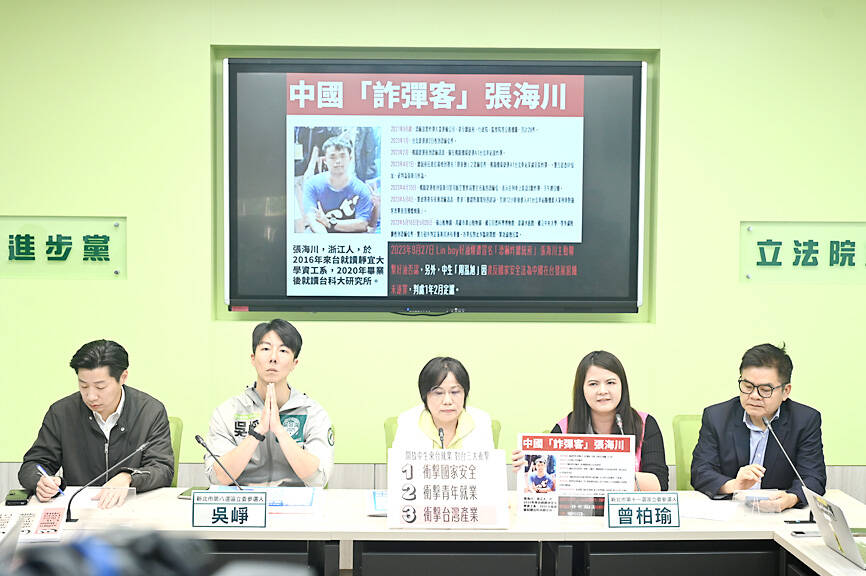The Democratic Progressive Party (DPP) caucus yesterday slammed a proposal by New Taipei City Mayor Hou You-yi (侯友宜), the Chinese Nationalist Party’s (KMT) presidential candidate, to permit a “significant number” of Chinese students to study and work in Taiwan, saying it would be detrimental to young Taiwanese.
At an event on Monday hosted by nine major industrial and business groups, Hou said that if elected, he would reinitiate cross-strait dialogue on the premise that Taiwan’s dignity would not be compromised and that the talks would be held in good faith.
The talks would include lifting a ban on Chinese tour groups and allowing a “significant number” of Chinese to study and work in Taiwan.

Photo: Wang Yi-sung, Taipei Times
DPP caucus director-general Liu Shyh-fang (劉世芳) said that allowing low-wage and low-skilled Chinese to work in Taiwan would adversely affect Taiwan’s international competitiveness.
Such policies would severely affect Taiwanese industries, DPP caucus secretary-general Chuang Jui-hsiung (莊瑞雄) said, adding: “There is no need for such overt pandering.”
DPP legislative candidate Tseng Po-yu (曾柏瑜) said that Japan and Germany have warned about spying by Chinese students, and such a policy would pose a significant threat to national security.
DPP legislative candidate Justin Wu (吳崢) asked whether Hou’s platform was similar to the Economic Cooperation Framework Agreement (ECFA) touted by former president Ma Ying-jeou (馬英九), adding that Hou’s policy seemed to be offering aid to China.
Independent Legislator Freddy Lim (林昶佐) said the international community is trying to contain China and Russia, and called on the KMT to take note of international trends and think of the next generation.
Separately, DPP spokesman Chang Chih-hao (張志豪) said that Hou’s comments lacked careful thought and his platform rehashes a policy that was rejected by the Taiwanese public a decade ago.
Hou evidently thinks that a China-reliant economy is the only way out, he added.
Separately, Hou’s campaign office spokesman, Chen Po-han (陳柏翰), accused the DPP of again resorting to smear tactics to win the election.
Vice President William Lai (賴清德), the DPP’s presidential candidate, had said in 2008, when he was a legislator, that “Chinese war jets will follow on the tails of its civilian airliners, or the airliners will be carrying People’s Liberation Army soldiers.”
None of those predictions have come true, and despite the DPP’s proclaimed hatred for the ECFA, it has not unilaterally halted the agreements under it, Chen said.
Hou’s policy hopes to de-escalate tension and promote mutual understanding, he said, adding that Hou has consistently opposed China’s “one country, two systems” platform.
Hou will continue to oversee the strengthening of Taiwan’s self-defense capabilities and uphold the free and democratic government of the Republic of China, he added.

NATIONAL SECURITY THREAT: An official said that Guan Guan’s comments had gone beyond the threshold of free speech, as she advocated for the destruction of the ROC China-born media influencer Guan Guan’s (關關) residency permit has been revoked for repeatedly posting pro-China content that threatens national security, the National Immigration Agency said yesterday. Guan Guan has said many controversial things in her videos posted to Douyin (抖音), including “the red flag will soon be painted all over Taiwan” and “Taiwan is an inseparable part of China,” while expressing hope for expedited “reunification.” The agency received multiple reports alleging that Guan Guan had advocated for armed reunification last year. After investigating, the agency last month issued a notice requiring her to appear and account for her actions. Guan Guan appeared as required,

A strong cold air mass is expected to arrive tonight, bringing a change in weather and a drop in temperature, the Central Weather Administration (CWA) said. The coldest time would be early on Thursday morning, with temperatures in some areas dipping as low as 8°C, it said. Daytime highs yesterday were 22°C to 24°C in northern and eastern Taiwan, and about 25°C to 28°C in the central and southern regions, it said. However, nighttime lows would dip to about 15°C to 16°C in central and northern Taiwan as well as the northeast, and 17°C to 19°C elsewhere, it said. Tropical Storm Nokaen, currently

‘NATO-PLUS’: ‘Our strategic partners in the Indo-Pacific are facing increasing aggression by the Chinese Communist Party,’ US Representative Rob Wittman said The US House of Representatives on Monday released its version of the Consolidated Appropriations Act, which includes US$1.15 billion to support security cooperation with Taiwan. The omnibus act, covering US$1.2 trillion of spending, allocates US$1 billion for the Taiwan Security Cooperation Initiative, as well as US$150 million for the replacement of defense articles and reimbursement of defense services provided to Taiwan. The fund allocations were based on the US National Defense Authorization Act for fiscal 2026 that was passed by the US Congress last month and authorized up to US$1 billion to the US Defense Security Cooperation Agency in support of the

PAPERS, PLEASE: The gang exploited the high value of the passports, selling them at inflated prices to Chinese buyers, who would treat them as ‘invisibility cloaks’ The Yilan District Court has handed four members of a syndicate prison terms ranging from one year and two months to two years and two months for their involvement in a scheme to purchase Taiwanese passports and resell them abroad at a massive markup. A Chinese human smuggling syndicate purchased Taiwanese passports through local criminal networks, exploiting the passports’ visa-free travel privileges to turn a profit of more than 20 times the original price, the court said. Such criminal organizations enable people to impersonate Taiwanese when entering and exiting Taiwan and other countries, undermining social order and the credibility of the nation’s